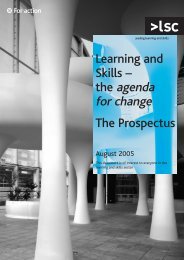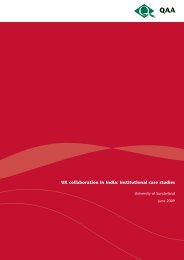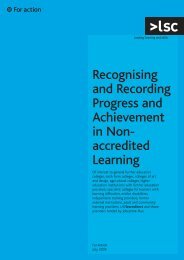The Learning and Skills Councils Annual Report and Accounts for ...
The Learning and Skills Councils Annual Report and Accounts for ...
The Learning and Skills Councils Annual Report and Accounts for ...
You also want an ePaper? Increase the reach of your titles
YUMPU automatically turns print PDFs into web optimized ePapers that Google loves.
Data management<br />
82. <strong>The</strong> Internal Audit review<br />
undertaken in early 2009 looked<br />
at the corporate management of<br />
LSC data including identification,<br />
documentation <strong>and</strong> specification<br />
of business requirements <strong>and</strong><br />
ownership of data sets.<br />
83. <strong>The</strong> review identified that there<br />
were significant initiatives being<br />
driven <strong>for</strong>ward to improve controls<br />
<strong>and</strong> procedures around corporate<br />
data management. <strong>The</strong>se included<br />
work streams around the<br />
In<strong>for</strong>mation Security Improvement<br />
Project, the implementation of<br />
the Mood enterprise architecture<br />
toolset <strong>and</strong> the <strong>Report</strong>ing <strong>and</strong><br />
Management In<strong>for</strong>mation Tools<br />
Policy. <strong>The</strong> review concluded<br />
that while these were positively<br />
contributing to governance <strong>and</strong><br />
control, until they were fully<br />
implemented only a restricted<br />
assurance could be given.<br />
Business change<br />
programmes<br />
84. <strong>The</strong> Internal Audit review<br />
concluded that effective<br />
corporate programme <strong>and</strong><br />
project management was not<br />
embedded across the LSC.<br />
A supportive programme<br />
management framework to<br />
ensure delivery was not in place,<br />
leading to exposure to the key<br />
risk of failing to effectively design<br />
<strong>and</strong> set up programmes <strong>and</strong><br />
projects that contributed to the<br />
achievement of LSC objectives<br />
<strong>and</strong> impacting on the LSC’s<br />
ability to engage effectively<br />
with the sponsor departments.<br />
Many of the requirements of the<br />
OGC framework <strong>for</strong> managing<br />
projects were missing. Work was<br />
commissioned by the National<br />
Director of Finance <strong>and</strong> Resources<br />
to develop a table of the biggest<br />
projects in the LSC; this also<br />
identified significant issues<br />
regarding governance <strong>and</strong> project<br />
management.<br />
85. Following agreement of the top<br />
programmes <strong>and</strong> risks, work was<br />
undertaken with SROs to adopt<br />
the training required to carry out<br />
the roles as set out in the OGC<br />
framework. In order to facilitate<br />
<strong>and</strong> support the introduction<br />
of the framework, a Corporate<br />
Programme Management Office<br />
function was created to act as<br />
a centre of excellence. Other<br />
aspects of the framework will<br />
also be implemented. This work<br />
was supported by the Director<br />
of In<strong>for</strong>mation Management<br />
Strategy, who agreed that a<br />
consolidated approach to change<br />
programmes was necessary<br />
that would integrate the overall<br />
business change programme <strong>and</strong><br />
support in<strong>for</strong>mation management<br />
programmes.<br />
86. In the absence of an in<strong>for</strong>mation<br />
compliance statement, Internal<br />
Audit was unable to give any<br />
in-year assurance on IT-related<br />
legislation.<br />
Train to Gain<br />
87. <strong>The</strong> National Audit Office<br />
undertook an evaluation of how<br />
effectively Train to Gain had been<br />
designed <strong>and</strong> implemented <strong>and</strong><br />
assessed its per<strong>for</strong>mance from its<br />
introduction in March 2006. <strong>The</strong><br />
report, Train to Gain: Developing<br />
the skills of the work<strong>for</strong>ce,<br />
was prepared <strong>for</strong> Parliament<br />
<strong>and</strong> published in July 2009. It<br />
concluded that the programme<br />
was not good value <strong>for</strong> money.<br />
88. BIS <strong>and</strong> the LSC’s view was that<br />
while inevitably there was some<br />
‘deadweight’ in this programme,<br />
overall it was a valuable <strong>and</strong><br />
effective way of increasing<br />
essential skills <strong>for</strong> those already in<br />
the work<strong>for</strong>ce, <strong>and</strong> was doing so<br />
in record numbers at the height<br />
of the recession, precisely when it<br />
was most needed.<br />
89. Following the National Audit<br />
Office report, the Public <strong>Accounts</strong><br />
Committee took evidence in late<br />
2009 <strong>and</strong> published its report<br />
in January 2010. <strong>The</strong> Public<br />
<strong>Accounts</strong> Committee concluded<br />
that Train to Gain had not been<br />
well managed, <strong>and</strong> there should<br />
have been realistic targets <strong>and</strong><br />
better management of dem<strong>and</strong>,<br />
together with more focus on the<br />
areas where it had been most<br />
effective. BIS <strong>and</strong> the LSC agreed<br />
that it was a sensible stage at<br />
which to implement a number of<br />
refinements <strong>and</strong>, indeed, many of<br />
these had been in the process of<br />
implementation.<br />
42 LSC <strong>Annual</strong> <strong>Report</strong> <strong>and</strong> <strong>Accounts</strong> 2009–10
















